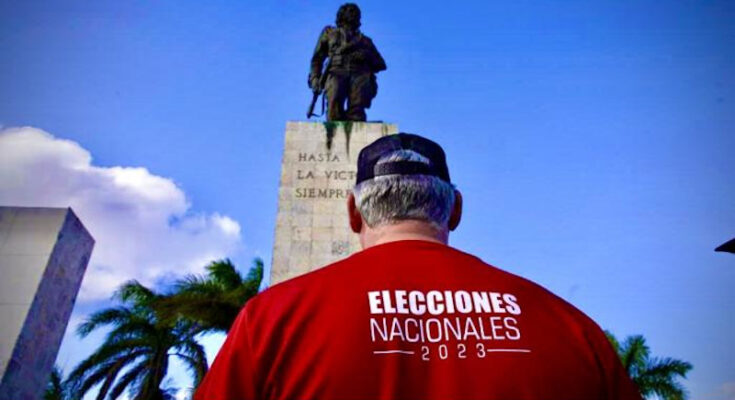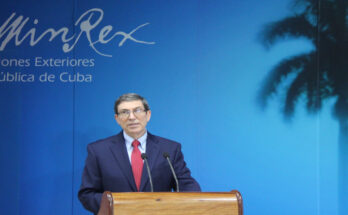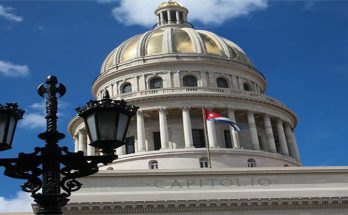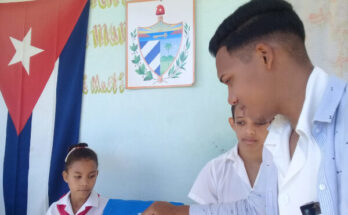“The people, the heroic Cuban people, are the most significant in this victory,” stressed on Wednesday the First Secretary of the Central Committee of the Communist Party and President of the Republic, Miguel Díaz-Canel Bermúdez, referring to the results obtained in last Sunday’s national elections.
It is to the Cuban people -insisted the Head of State during his speech at the meeting of the Council of Ministers, corresponding to the month of March- to whom we must “give all our recognition for their courage, for their dignity, for their loyalty, as the main protagonist of this victory”.
“On behalf of the Council of Ministers, the Political Bureau and the Secretariat of the Central Committee, who are present here, we send a message of respect, admiration and immense affection to our people, to whom we belong,” said the President amidst the applause of those present.
To the Cuban people, the dignitary ratified, “we are going to serve with passion, with commitment, without reluctance, to the last consequences”.
This victory must be celebrated, said Díaz-Canel at the meeting, which was led by the member of the Political Bureau and Prime Minister, Manuel Marrero Cruz.
In his reflections, motivated by the presentation to the highest body of the Cuban Government of the results of the national elections, the President considered it essential, at the time of making an assessment of them, to take into account three fundamental elements.
In the first place, he said, there is the significance of the victory in those elections; then the lessons to be learned from this process, with an approach without complacency for the victory, and, together with them, he highlighted the priorities to be worked on in the future, to follow up on this process, which reaffirmed revolutionary convictions, but which also indicated steps to be taken to continue consolidating unity within the Revolution.
ELECTORAL CONTEXT
Díaz-Canel reminded the audience of the demanding electoral context in which this process took place, in spite of which the majority of the people showed their support and confidence in the Revolution.
At the same time, he considered that Sunday’s results “demonstrated, once again, the transparency and strength of our electoral process”.
The scenario, he said, has been very complex from the economic point of view, since imperialism continues to bet on suffocating our economy to provoke discouragement, discouragement and rupture with the revolutionary process among the population, and thus bring about the longed-for social collapse to which they aspire.
The comparison that the enemy pretends to make between these results and those obtained in the 2018 national elections is opportunistic, since they are totally different electoral contexts, the president commented, and made reference, among other aspects, to inflation, the instability in the electro-energy system, the intensification of the economic, commercial and financial blockade, the insertion of Cuba in the spurious list of State sponsors of terrorism, and the discrediting campaign that, from the media point of view, the U.S. government launched against the Cuban Revolution.
In the midst of all this, the President recalled, in the last six months of the life of this country we have carried out three highly significant elections: the Family Code, the municipal elections and the national elections.
He said that carrying out these three processes, in the midst of these conditions, is “an act of courage of the Revolution”. And we have done it, he added, complying with what is set forth in the Constitution of the Republic, overcoming the implications that the economic-social situation could have, trusting in the people and in our convictions.
The fact that the people came out in overwhelming majority to overcome the two previous electoral processes and that the results of these national elections were superior to them, is even more significant, he underlined.
The 76 % turnout of our people, he appreciated, is a sign of confidence, because this “would not have been possible if the people did not continue trusting in the Revolution”.
“The people showed civism, but also patriotism, loyalty to the Revolution, fidelity to the Revolution, political conscience, demonstrating that they do know and feel who is the real cause of the situation we are facing,” said the First Secretary of the Central Committee of the Communist Party.
The Cuban people, he said, overcame this situation and “voted in favor of the Revolution”. Likewise, he acknowledged that the results obtained were possible because the people appreciate that the highest organ of the People’s Power and the new Assembly that we are going to constitute as a result of those results, is “a legitimate and necessary instance to face the difficulties and move forward”.
NEVER LET DOWN THE PEOPLE’S TRUST
Now the most important thing, Díaz-Canel emphasized before the members of the Council of Ministers, is that the people’s trust can never be disappointed, and that means that, among the lessons, among the lessons we have learned, we have to strengthen and improve the work of the National Assembly of People’s Power, of the government bodies at all levels and, of course, of the Party, the Young Communist League and the mass organizations.
These results must commit all of us -he insisted- to “turn ourselves permanently to each one of the territories for which we have been elected, in which they have deposited a vote of confidence in us and in the Revolution, and in what it represents”.
As Fidel himself told us, he recalled, those results have to lead us to “work for the whole country, in representation of all Cuba: all working for Cuba.”
“If we deputies work systematically in each of the municipalities or districts, and accompany the local authorities, without supplanting functions, if we continue to listen to the people and take problems that go beyond the territories to higher instances for their solution, we are going to take away more and more pieces of the problems every day.”
CUBA IS AN EXAMPLE FOR THE WORLD
The First Secretary of the Central Committee of the Communist Party denounced the anti-Cuban campaigns -orchestrated by certain counterrevolutionary and international press- that pretend to discredit the electoral results in Cuba.
It is that, he evidenced, the same press that makes up electoral results of first world nations that are neither blockaded nor attacked nor subjected to a huge media campaign, and the turnout barely exceeds 60%.
“Then we should ask ourselves why this biased and tendentious look against Cuba: simply, comrades, because we are an example for the world. And that example must continue to be defended, and that example must also be defended with the encouragement given by this result of the people in these elections,” the president said.
The Cuban President considered that, even when the “counterrevolutionary campaign insists on presenting the elections as lacking in transparency, the truth is that they do not have a single proof, not a single evidence of any irregularity”.
The transparency of our elections,” he said, “began with the proposals of the pre-candidates in the plenary sessions of the social and student organizations. Afterwards, another process took place in the municipal assemblies of the People’s Power, in which the candidacies were approved, sometimes making changes in the people initially submitted to consultation.
Díaz-Canel also mentioned how, on voting day, the ballot boxes are presented open, before voting begins, so that the people can see that there is nothing inside them that could lead to fraud; then, when the scrutiny takes place, it is a totally public act, the ballot boxes are opened and the ballots are counted in front of the people.
“We do not need international observers. The entire people have the right, the possibility and the power to be observers, and they do so.”
In his words, he also highlighted the work system that was deployed at the community level, which “showed that, when we constantly interact with the grassroots, of which we are all part and to which we owe ourselves, we can help to solve problems, we can help to understand, we can argue”.
Regarding the tours carried out in the last seven weeks by the candidates for deputies to the National Assembly of People’s Power, the President stressed that they were not only for the population to approve a candidacy or express their will and understanding with the strategy of the united vote. They were meetings where, in addition -he clarified-, the problems we have were raised, confidence was given to the candidates, but it was also demanded that, when representing the people, they should take their problems to the National Assembly of People’s Power.
“There is a mixture of confidence and expectation in how we are going to represent them; a demand that we link ourselves more, that we make that kind of meetings more systematic, and also a totally enriching experience for all of us who participated in it.”
Díaz-Canel then spoke of how many accumulated problems could have been solved in those days; of the need to maintain and improve that work system as a priority of the new Legislature, and of the constant follow-up that should be made of all the proposals.
The main lesson learned is related to “everything that a close, direct, honest and transparent link with the population brings”; hence his emphasis on the need to continue with these tours as a work system, which must be one of the elements to be included in the improvement of the National Assembly in the next Legislature.
And this, he assessed, must also have an expression of improvement in the Council of Ministers, the agencies of the Central Administration of the State and all our institutions, as well as in the municipalities.
“There is an expectation, there is a sense of trust, and I believe that we all have to work as part of this lesson in order to find, above all, an economic response to the situation the country is facing”, he said.
WHAT ARE THE PRIORITIES?
From these contributions, work priorities also emerged, among which the Head of State highlighted the need to analyze in a differentiated way the problems of each place; to undertake in a more intense and intentional way, actions for the improvement of the municipalities; the production of food; the attention to the fundamental demands of the population, which are very concentrated in water, transportation and housing.
He also mentioned the importance of improving the quality of services and, above all, the good treatment of the population, which, he said, “must be respected, facilitated, well attended and not bothered, because the attitude of the person who provides a service to the population cannot be to bother, to irritate, to cause discouragement”.
Likewise, he commented on the work that must be done to continue strengthening our educational, health, cultural and sports systems; to achieve an adequate relationship between the state and non-state sectors of the economy; to fight inflation and speculative prices; to give greater participation to young people in fundamental tasks; to advance in the social transformation of neighborhoods and in the attention to people in vulnerable situations; to eliminate any vestige of violence against women and any form of discrimination; to confront directly and effectively corruption, crime and social indiscipline; as well as to promote local development projects.
All that has been done and the results obtained in this electoral process, said the First Secretary of the Central Committee of the Communist Party, “give us strength, ratify our convictions, give us tremendous energy to continue moving forward, because in these elections Cuba won”.
(Taken from Granma)




